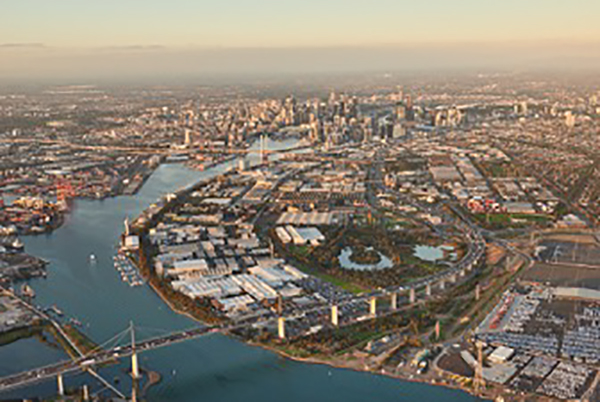Semester 2 2017 Thesis 2
Intricate Urbanism: Civic and Civil Infrastructure at Fishermans Bend
Elliet Spring & Karen Burns

Studio Outline:
Urban renewal redevelops underutilised urban land. Melbourne, like other global cities continues to evolve as former industrial land is cleared to make way for new residential, commercial and cultural uses. Misty renders filled with smiling people, along with punchy graphics and lofty vision statements promise a lively, vibrant, connected new city precinct. We should be excited, then, by the Fisherman’s Bend urban renewal project, a 485-hectare industrial landscape directly adjacent to the CBD. Instead, Melbournians are rightly sceptical. We have heard these promises before. This studio asks students to develop a new urban model for Fisherman’s Bend by focussing on activation, tactical and spontaneous urbanism, and civic and civil infrastructure in a portion of the vast site. We seek to understand how a bottom-up, or truly community-led approach can lead to new urban outcomes. Our project challenges traditional top-down models of city-making, in which urban designers work with developers and authorities to create new city precincts.
We begin by examining current proposals for the precinct and by visiting the site. In parallel we will critically investigate local and global urban renewal projects, including Newcastle, Amsterdam, Detroit and Oslo, to understand how they failed or fulfilled their promises of transformation.
Infrastructure, both civic/cultural and civil, will be used to organise and generate a programmatic intervention. Students will select a necessary piece of civil infrastructure, such as a bridge, rail line, or even a wind farm, and then complement and activate it with a civic or cultural program, such as a town hall, art gallery, library, school or healthcare facility. This choice will be student driven. We aim to activate public life and understand community as a shared urban practice (Talja Blokland, Community as Urban Practice, 2017). By semester’s end you will have developed a complete building or a network of tactical interventions.
Studio Leaders
ELLIET SPRING: After graduating from the University of Melbourne in 2003, Elliet travelled to New York on the Rachel Ackman and Fritz Janeba fellowships to undertake postgraduate studies at Columbia University, where she studied under Bernard Tschumi. She remained in New York, working for WORKac and Snøhetta before relocating to Norway in 2010, where she worked for innovative designers Helen & Hard. She returned to Melbourne in 2010 and currently works at MGS Architects.
KAREN BURNS is an architectural theorist, historian and critic. She was an editor of the architectural journal Transition magazine and she is a founding member of Parlour and Parlour Inc, a website and NGO advocacy group for equity in architecture. Her research interests include radical practices in the 1970s and 1980s as well as 19th design reform.
Learning Outcomes:
The studio explores exhibition design firstly at a small scale, with visits to archives and the making of critical responses to this. Students will all design and install an exhibition of their own at the Grainger Museum, an excellent opportunity to interact with curators and have an exhibition on their resume. Students will also have the opportunity to participate in a series of talks as part of the exhibition. The final format of the work is a fully developed exhibition design proposal for the Science Gallery Melbourne. This is completed in collaboration with input from the School of Culture and Communication and the Faculty of Biosciences. There will also be input from curators and exhibition designers to assist in developing the work. This studio has been structured to emphasise the process of research through design and includes opportunities to experiment across mediums, to generate work quickly and critically, and to promote reflection on the work produced in order to refine it.
Reading and Reference:
- Fishermans Bend and Melbourne policy documents & Fishermans Bend Vision
- UN Habitat III – The Quito Papers
- http://www.newyorker.com/business/currency/top-down-bottom-up-urban-design
- Tactical Urbanism: Short-Term Action, Long-Term Change (2011)
- The Interventionists Toolkit (Places Journal) (2011)
- Lecture Stan Allen – Landform Building Lecture at the AA September 2015
ST1/02 Tuesday 11:00am - 2:00pm, MSD Room 236
ST2/02 Tuesday 3:15pm - 6:15pm, MSD Room 236